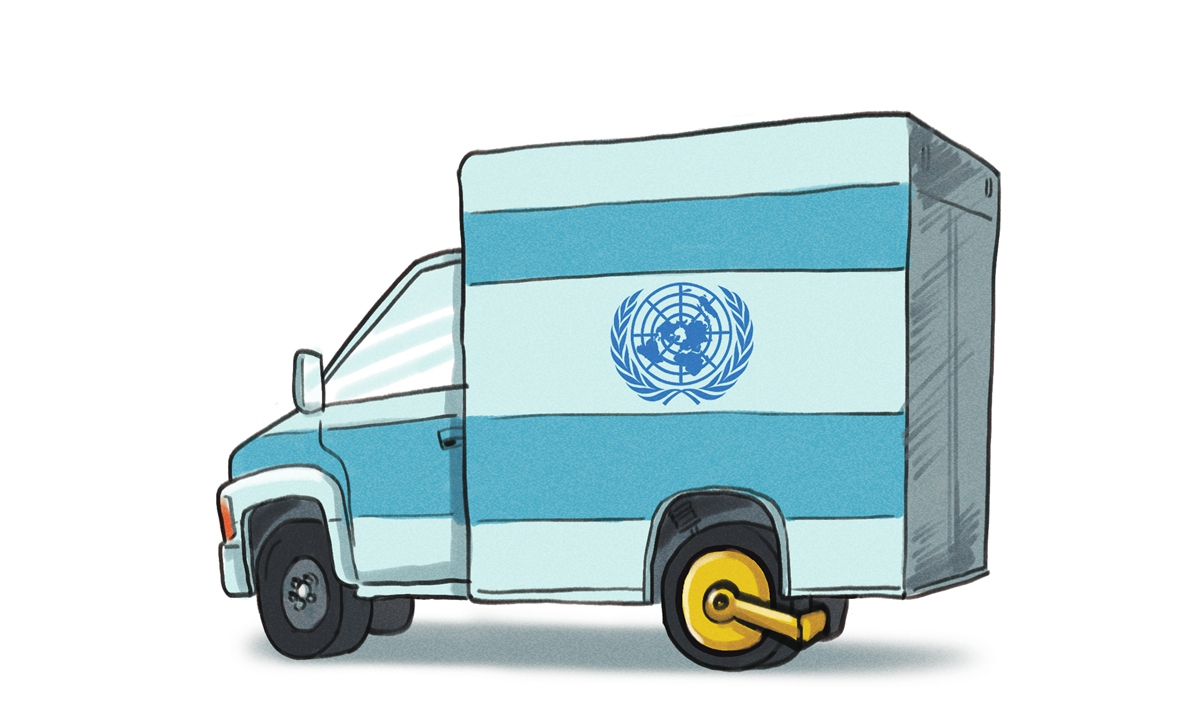Can a new life for the UN start at 75?
By Andrey Kortunov Source: Global Times Published: 2020/9/17 20:14:24

Illustration: Liu Rui/GT
Blowing out 75 candles is great exercise for the lungs. The United Nations turned 75 this year. It is a remarkable accomplishment in itself. The League of Nations, which preceded the UN, survived for two decades only. Still, can we cheerfully say at this jubilee (and with every passing year), is the body's ambition growing higher? Is its appetite for meaningful change increasing? Hardly so. To argue that the UN is not today in its best shape is to state a political platitude.
There are many graphic manifestations of the serious institutional deficiencies that prevent the UN from playing its legitimate role as the centerpiece of the global governance system. The UN consistently fails to take action on violent regional conflicts - be it in Asia (Syria), in Europe (Ukraine), or in Africa (Libya). Its General Assembly resolutions quite often have little or no impact on the behavior of member states, which the resolutions aspire to influence.
The UN Security Council meeting room sometime turns into a scene for fierce propaganda duels rather than remaining as a calm place for reaching consensus for common threats and challenges. On top of that, the UN is in a state of a continuous financial crisis. It has questionable personnel policies based on national quotas, and is frequently accused of waste and mismanagement.
Whom should we hold responsible for such a dismal picture within the leading and by far the most distinguished global institution? Many in Russia (and arguably in China as well) would be happy to blame everything on the US. Indeed, over the last couple of years, Washington has demonstrated a highly critical, biased and even irresponsible attitude to the UN system. It abandoned UNESCO, the UN Human Rights Council and WHO. It more than once complicated access of foreign representatives to the UN headquarters in New York. It pursued unilateral actions in clear violation of collegial decisions by the Security Council. President Donald Trump, in particular, has never been shy in manifesting his condescending view of the UN and its role in the international system.
Still, it would be unfair to impose all the responsibility for numerous UN problems, shortcomings and deficiencies on the US only. Other member states and, in the first place, other permanent members of the Security Council (P5), should take a critical view on their own performance in the building on the East River's embankment. Every failure to come to an agreement within the Security Council results in a serious damage to the body's reputation. More importantly, the chronic paralysis of the Security Council reinforces and justifies temptations to bypass it altogether. It sometimes even seeks to circumvent norms of international law. For now, actions bypassing the Security Council are still perceived as exceptional, but they could soon become the rule. For now, they are a deviation from the norms - but soon they could become perilously commonplace.
Many enthusiasts of the UN reforms look for simple solutions to its complex institutional problems. Maybe, they argue, we should make the Security Council larger and more representative. Some say that the UN Secretariat needs more authority, more autonomy and more resources. Others maintain that the solution lies in a redistribution of responsibilities between the Security Council and the General Assembly in favor of the latter.
In my opinion, no simple solution will do the trick. For example, a larger and more diverse Security Council is likely to be even less efficient, since new members will bring to the table their particular interests, national prejudices and grievances. If the Secretariat becomes more autonomous, odds are that it will be accused of unaccountability and self-serving decisions (as the Deep State is demonized today by populists of all sorts). Delegating more power to the General Assembly at the expense of the Security Council would make the P5 members even less interested in the future of the UN than they are now.
A true reform of the UN cannot start in New York; it should start in national capitals of member states. The UN, like any other international organization, is as bad or as good as its members want it to be. Before changing institutions there should be a change in the basic logic of members. Nation states, including the most powerful of them, have to demonstrate determination to move to a new level of governance by relinquishing a part of their national sovereignty.
Historical experience suggests that those not willing to sacrifice a part risk losing the whole. Unfortunately, the UN is not at all immune to the fate of its predecessor.
The author is director general of the Russian International Affairs Council. opinion@globaltimes.com.cn
RELATED ARTICLES:
Posted in: VIEWPOINT,OTHER REGIONS